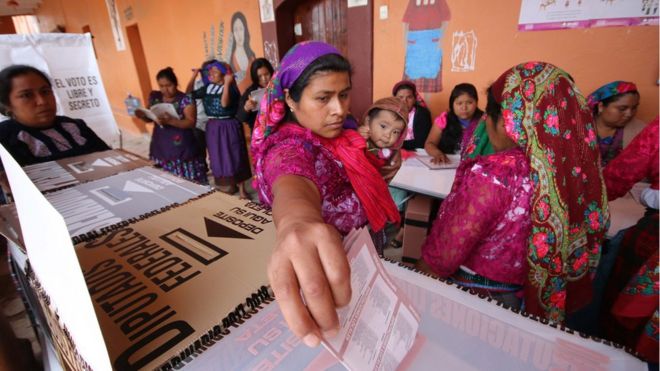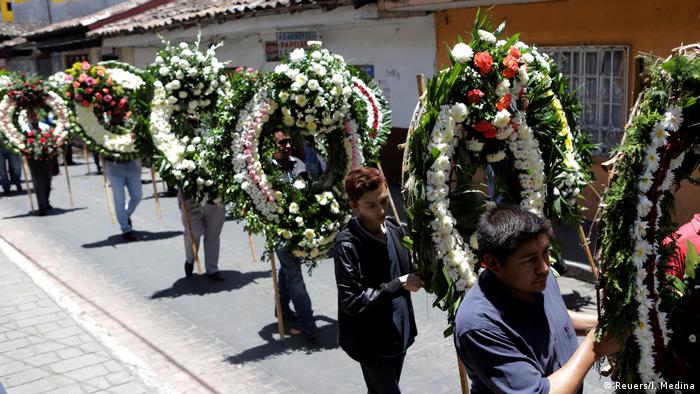Is There Hope For Mexico?
"No one has been more active during these campaigns [than criminal groups]."
"You have to be a little crazy to run for [political] office here [in Mexico]."
Alejandro Martinez, top official, National Action Party, Guerrero State
"For the older [drug] cartels that were most about smuggling drugs in the U.S., they couldn't care less who was the mayor as long as the mayor did not get involved or try to impede the business."
"But in this new world of more local gangs, controlling local governments is a crucial asset."
Alejandro Hope, security analyst, Mexico City
"Half of my time goes to figuring out how to confront them [local criminal gangs], how to stop them."
"[I am forced to [lean heavily] on federal security services for assistance] because the municipal police forces are of almost no help [in confronting gangs]."
Hector Astudillo, governor of Guerrero state
 |
| A woman casts her ballot at a polling station in Oaxaca state AFP |
The governor of the Pacific Coast state of Guerrero, one of the country's poorest and most violent states, is incapable of managing law and order in his state as a result of the growing influence of local criminal gangs in local politics. Sunday, July 1st, 2018 saw the end of the most extensive, largest national electoral process that Mexico has ever undergone. And during that time of political and electoral upheaval, Mexico has seen the madness of violence grow to intolerable proportions.
Mexico has become increasingly a country of runaway violence, mostly resulting from its robust and unstoppable drug industry with cartels battling one another for primacy and territory, and enlisting local politicians and police forces in their trajectory to achieving untouchable status while wreaking havoc throughout society. In this election season now completed, over 3,400 local, state and federal posts were to be filled in the country's largest general election to ever be held.
In lock-step with campaign the killing of an estimated 136 politicians, took place: political operatives, candidates or potential candidates mostly running for local offices, along with party members and campaign workers, a shocking toll of deadly violence to plague any society. The death toll had the desired effect of persuading hundreds of candidates to abandon their electoral plans, fearing for their lives and leaving some parties unable to field nominees in certain posts altogether.
 |
| Mourners carry wreaths for two politicians, Juana Irais Maldonado and Erika Cazares, who were murdered |
The past decade has seen criminal elements co-opting local politics through influencing the electoral process in a national atmosphere where collusion between politicians and criminal organizations has always prevailed to a degree. With the use of selective violence the criminals have been successful in handpicking their own slates of candidates in certain areas. The goal; to achieve elect cooperative officials in key local offices to aid in protecting and growing the criminals' illegal enterprises; exerting control over local police forces, along with securing lucrative government contracts.
Above and beyond the killing toll, over 400 additional instances of aggression have been reported which were inclusive of attempts at assassination, threats, intimidation and kidnappings. No fewer than 345 municipalities across the country reported such cases. Mexico's weak and corrupt law enforcement and ineffective judicial systems has resulted in record violence in the country; ironically enough a central focus in the presidential contest.
The violence has for the most part been occurring in more rural municipalities where the criminal element find it softer going to gain control over local politicians. "It is absurd that in many of these small communities, we have to ask for permission to run campaigns", stated Moises Antonio Gonzalez Cabanas, a professor, competing for a seat in Guerrero's state Congress, among the hardest-hit regions for violence, where at least 14 candidates and prospective candidates were assassinated since last fall.
One of whom was Abel Montufar of a family heavily involved in the politics of the region. He began receiving threats only hours after stating he was preparing his election campaign for state Congress. Abandon the race or you will die, went the threats. He response was "I am not afraid of you". Nine days after his campaign began he was shot six times, his body left slumped in his parked van. No mystery over who murdered him, according to his relatives: criminals in support of a rival candidate whom they could control.
 |
| Lopez Obrador has been leading the presidential polls in the run-up to the election |
Labels: Criminality, Drugs, Elections, Mexico, Violence

<< Home